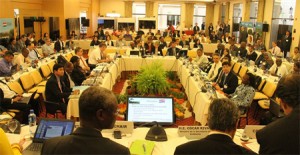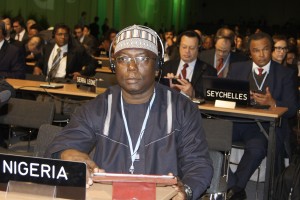There are indications that Nigeria may host the next UN-REDD Policy Board meeting, which will be the 13th in the series. The development is however not yet confirmed as the 20-member UN-REDD Programme Policy Board that met during the week in Lima, Peru are also considering Tanzania to organise the gathering.

The 13th UN-REDD Policy Board meeting is scheduled to hold November 2014.
The UN-REDD Programme Policy Board is made up of representatives from partner countries, donors to the Multi-Partner Trust Fund, civil society, Indigenous Peoples and the three Participating UN Organisations (FAO, UNDP and UNEP). The Policy Board’s role is to approve financial allocations and give strategic direction to ensure the overall success of the Programme.
A forester, Salisu Dahiru, who is of the Forestry Department in the Federal Ministry of Environment, heads Nigeria’s UN-REDD Programme, which a couple of years ago accessed about $4 million from the parent body to execute the country’s REDD Readiness Programme.

Dahiru disclosed that, if Nigeria eventually gets the nod, the meeting would probably hold at the Obudu Cattle Ranch (or Obudu Mountain Resort) in Cross River State. With a semi-temperate climate, the Ranch has in recent times seen an influx of both local and international tourists because the development of tourists facilities there by the host government has turned it into one of the most popular tourist centres in the country.
At the Lima meeting that held 7-9 July 2014, the UN-REDD Programme approved $35,481,763 in REDD+ readiness funds. The policy board also approved decisions that support the design of a 2016-2020 Programme strategy that will align with evolving partner country needs. The meeting was attended by more than 100 participants representing 25 countries, indigenous peoples and civil society organisations, and donor countries – and was marked by a collaborative, forward-looking atmosphere.
The approved REDD+ readiness funds included the allocation of funds for the National Programmes of Argentina, Cote d’Ivoire and Mongolia – respectively $3,842,370, $3,210,000 and $3,996,450. Participants highlighted the unique REDD+ learning opportunities of each National Programme. Argentina’s programme will address the large numbers of private landowners in the agriculture sector and soy production as one of the main drivers of deforestation. Cote d’Ivoire’s innovation programme will take into account the competition for forest lands with the cocoa, timber and rubber industries. Mongolia represents the first boreal forest National Programme to be funded by the UN-REDD Programme.
Policy board members also approved $24.4 million for the Programme’s “Support to National REDD+ Action: Global Programme Framework 2011-2015” (SNA) modality of support to partner countries for 2015. This includes direct support to countries in the form of “targeted support” and “backstopping”, which are designed to support and strengthen countries’ efforts to design REDD+ strategies, develop technical capacities and exchange knowledge.
In addition, members approved a roadmap to develop the 2016-2020 UN-REDD Programme strategy by May 2015, which includes a strong participatory process. Participants, including donors, cited the value of the UN-REDD Programme in building the foundation of REDD+ readiness and the importance of continuing the Programme through 2020 with a strategy that is designed to meet the evolving needs of partner countries as they progress towards the results-based phase of REDD+.
Other highlights of the meeting included:
- Uganda’s overview of its REDD+ efforts contributing to its goal to achieve 24% forest cover (from a current 15%) through reforestation, conservation and sustainable agroforestry.
- Ecuador’s presentation of a new ministerial level decree on free, prior and informed consent, and the lessons learned from the process.
- A progress update on the REDD+ Academy, with the first regional sessions announced to take place in Indonesia, Nigeria and Argentina.
- Demonstration of a new tool for tracking progress of National Programmes – the REDD+ Radar – that can be used by country partners, donors and others.
The Policy Board meeting was preceded by an Information Sharing Day on 7 July that was attended by H.E. Pak Heru Prasetyo, Head of the Indonesia National REDD+ Agency, and H. E. Manuel Pulgar-Vidal Peru Environment Minister, who both highlighted the importance of REDD+ to climate change mitigation and the importance of the support delivered through the UN-REDD Programme to advance national REDD+ efforts. The ministers also emphasized the role of forests at the upcoming climate summit and UNFCCC COP20 in Lima.
During the Information Sharing Day, countries shared experiences and progress on key areas of work. Panama shared its new land-use mapping technology and a documentary on developing its national forest inventory. Zambia, Sri Lanka and Peru shared experiences and perspectives on their National Strategies. An update was also shared on preparations for the Secretary-General’s Climate Summit to take place in September 2014
